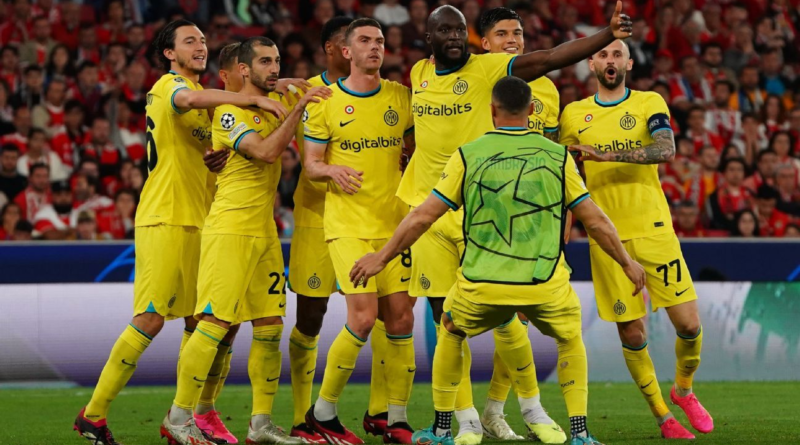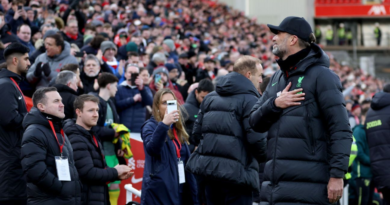Inter Milan are a chaotic mess, making their epic Champions League run a blast
LISBON, Portugal — It was never unthinkable that Inter Milan would get a good result away to Benfica in their Champions League quarterfinal, first leg. After all, their wage bill is more than twice as high and their squad cost nearly three times as high. And because we keep getting told how critical money is to success in this super-inegalitarian sport, that matters.
But it was, at a minimum, improbable that Inter would emerge as 2-0 winners of the first leg. Not when you consider that Benfica had lost just twice all season long, that Inter hadn’t actually won a game in more than a month and that the Estadio da Luz looked like this before kickoff:
Benfica ready… pic.twitter.com/eTYJsA4l0a
— Gabriele Marcotti (@Marcotti) April 11, 2023
Throw in the fact that Inter traditionally have instability and insecurity baked into their DNA — this season is no different and, if anything, it’s worse — and there’s a reason folks back home spoke of how the win in Lisbon was nothing short of a “feat.”
Folks bemoan the rising polarization in the game — even coming up with silly solutions like the Super League to counter it — and how the landscape is dominated by a handful of clubs who either parlay their history/location into hegemony, or rely on unlimited spending from sovereign wealth funds to compete. It’s true that spending matters but, thankfully, you still need to play the games. On the pitch, it’s 11 vs. 11, and nobody gives a rat’s behind about your paycheck — spending twice as much doesn’t make you twice as likely to win.
– What clubs need to do to qualify for Europe in 2023-24
It’s also true that few clubs in Europe who think of themselves as “big” — Inter have won three Champions League crowns, their most recent in 2010 — have shot themselves in the foot and paid such a hefty price for their attempts to keep up with the elite. They’re the equivalent of the rich family in the nice neighbourhood who try to keep up with both the nouveau riche, who move in down the street, and the wealthy aristocratic neighbours who have generational wealth. Teslas, private school tuition, fancy clothes are must-haves; meanwhile, they rack up debt.
Where some neighbours make smart investments and control their spending in the face of rising costs, Inter make a string of poor decisions and realize too late that profligacy is the path to bankruptcy. Now, the chickens come home to roost and it’s instant ramen for dinner, all the while keeping up appearances.
The result? Inter made losses in each of the past eight seasons for a total of nearly a quarter of a billion dollars. In 2021, their owners, China’s Suning Group, took out a $300 million loan from the club’s minority investor, Oaktree, putting the club up as collateral. With interest and fees, they’ll need to repay some $400m in the next 13 months or the club will be repossessed and given to Oaktree, which is why they keep talking about Inter becoming self-sufficient.
They’ve had no choice but to rein things in — and have had Financial Fair Play restrictions, too — and they’re coping with the conundrum facing clubs in their situation. When money is tight, do you spend what you have on youngsters with an upside or on veterans, especially loans and free agents, who cost less in fees (but more in wages) and can produce straight away? With some exceptions — like on-loan midfielder Kristjan Asllani, 21, and defender Raoul Bellanova, 22, who have contributed little — they opted mostly for the latter, short-term option.
Nearsighted? Sure. Planning? None. But given the club is essentially up for sale, the thinking was it would give them a better shot of winning domestically and achieving something in Europe, which brings brand exposure, prize money and commercial revenue, all of which Inter desperately need. That’s how you end up with the scattershot approach of “value” signings and free agents.
It’s undoubtedly a fun bunch. Goalkeeper Andre Onana arrived from Ajax as a free agent: injury and a nine-month doping ban (the tribunal found he accidentally took his wife’s prescription medication) kept other suitors away. On-loan central defender Francesco Acerbi, 34 years old, missed nearly a year of football while beating cancer (twice) in his early 20s, established himself as an international at Lazio, but was forced out in the summer after falling out with the club’s Ultras, who accused him of laughing after making a mistake that cost them a goal.
You’ve got veteran Manchester United alumni like 34-year-old Henrikh Mkhitaryan (via Arsenal and Roma) and 33-year-old Matteo Darmian (via Parma), both reinventing themselves — the former as a deep-lying midfielder, the latter as a central defender — against Benfica. Up front was Edin Dzeko, 37 years young and another free agent Premier League alumnus, while yet another free agent, Hakan Çalhanoğlu, a key performer this year, was unavailable.
Inter are balanced out by holdovers from the free-spending era. Defender Alessandro Bastoni, forward Lautaro Martinez and midfielder Nicolo Barella are three transfer hits who have lived up to the billing and are approaching their prime. Typically, the fear is that Inter may need to sacrifice at least one of them to balance the books, but for now, they’re huge contributors (Bastoni crosses the ball as well as any 6-foot-5 center-back you’re likely to see, Barella scored the opener in Lisbon and Martinez is a recent World Cup winner).
Then there’s Romelu Lukaku, whose situation sort of epitomizes the current plight of both Inter and Chelsea, who sent him there on loan.
Inter signed Lukaku from Manchester United for a club record €80m ($87m) in 2019. They won the title a year later, but then realized they were way overstretched financially (the coronavirus pandemic didn’t help) so they sent him to Chelsea for €110m, making a tidy profit along the way. He signed a massive deal at Chelsea, fell out with then-coach Thomas Tuchel and was loaned back to Inter until June.
Despite various highs and lows, Lukaku wants to stay. Inter want to keep him and Chelsea don’t want him back, except Inter can’t afford his wages and Chelsea can’t just write him off as a loss on their books. So expect a merry dance where both clubs pretend he’s returning to London this summer and then he stays put, probably with a pay cut.
– Stream on ESPN+: LaLiga, Bundesliga, more (U.S.)
If all of this sounds like a rag-tag psychodrama … well, it is. It’s not helped by the fact that Inter went on the slide recently in the league, slipping out of the top four, ironically at a time when they were creating (but not finishing) more chances than they had in a long time. In their past four Serie A games, they got one point and scored two goals, conceding five. All this with an xG of 7.87 and an xG conceded of 2.72.
But expected goals don’t placate fans and media, and few know this better than their bedraggled manager, Simone Inzaghi, he of the hangdog face and polite mannerisms. His critics say he’s too nice and too patient, that he lacks the killer instinct of his brother, Pippo, who had a much better career despite being less talented. Right now, though, he’s probably what Inter need and having been through a more “alpha male experience” with Antonio Conte, Inzaghi makes a nice change.
– O’Hanlon: Who are the best impact subs in soccer? (E+)
Inter as a club have become accustomed to this state of the affairs. Yes, ahead might be a future terrorscape of red ink, departing stars and defaulting owners, so they live in the present. And that means competing for a top-four finish in Serie A, a Coppa Italia — they’re in the semifinals — and enjoying the fact that you’re halfway towards the final four of the UEFA Champions League. There’s even a point of pride in knowing this team was put together on the (relative) cheap, with guys — many of them written off as greedy or demotivated in the past — who are giving their all.
It’s not so bad. Heck, it’s even fun.




